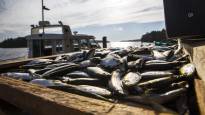The agriculture and fisheries ministers of the EU countries will discuss the fishing quotas of the Baltic Sea at a meeting in Luxembourg. Finland is hoping for relaxations in the herring fishing ban pushed by the Commission.
LUXEMBOURG Herring fishing in the Baltic Sea may end if the EU Commission passes its proposal on next year’s fishing quotas. The proposal would also ban salmon fishing between Åland and Merenkurku for a year.
Fishing quotas will be discussed at the two-day meeting of the EU’s agriculture and fisheries ministers starting today, Monday, in Luxembourg. Finland is represented at the meeting by a minister Sari Essayah (cf.).
Finland is hoping for relaxations in the commission’s basic proposal, which is feared to lead to the downfall of herring and salmon-based livelihoods in Finland. According to ‘s information, critical strains also occur in other member countries.
According to the government, the proposal to ban herring fishing is disproportionate and contradicts scientific guidelines. The International Oceanographic Research Council estimates that cuts of 20–40 percent would be sufficient for Finland.
Fishermen fear for their livelihood
The commission’s presentation has caused consternation among Finnish professional fishermen. According to the fishermen, the proposal would take away their livelihood if implemented.
– The effects are really drastic. The share of herring in Finland’s sea catch is about eighty percent and well over half of its value, CEO of the Finnish Professional Fishermen’s Association Kim Jordan says under the meeting.
Jordas emphasizes that professional fishermen are not against the reduction of quotas as such. According to him, the industry is ready for significant reductions.
– We have started from the idea of going according to ICES, i.e. scientific advice. It knows quite drastic cuts to quotas, but we are ready for that, says Jordas.
The Parliament’s large committee responsible for EU positions is also concerned about the effects of the fishing ban.
According to the committee, the ban would have “serious negative effects both socially and economically, but also in terms of security of supply and the state of the Baltic Sea.”
– It has been seen that the commission has at least not yet considered the socio-economic effects that the ban would have, says Jordas.
In the background, there is concern about the reduction of stocks
The Commission justifies the ban with the reduction of fish stocks and the desire to restore the herring stock to a sustainable level. According to the commission, the recovery of fish stocks would also be in the interest of Finnish fishermen.
However, the pressure to change the Commission’s proposal is great from the negotiations taking place in Luxembourg. Environmental organizations appeal to member countries to stop fishing for severely depleted fish stocks.
– The commission’s presentation reflects the very serious state of the herring stock, an expert from the FishSec organization Sara Söderström says.
Söderströmin refers to the EU’s multi-year management plan, which requires fish stocks to be kept above a certain minimum level. According to him, catching the herring stocks of the Central and North Baltic Sea would be against EU legislation.
According to Söderström, negotiations on fishing quotas in the Baltic Sea can be long and difficult. He hopes that the commission will not have to back down from its demand to ban the targeted fishing of herring.
Kim Jordas of professional fishermen also anticipates long and difficult negotiations, the results of which are difficult to assess in advance.
– The commission’s presentation does not give a very good picture of fishing policy. Business is in very uncertain hands.
The goal is sustainable fish stocks
The purpose of EU fisheries policy is to balance the needs of the fishing industry and the preservation of fish stocks.
It aims to ensure that fishing is sustainable and that fish stocks can recover and survive in the long term, while supporting the fishing industry and fishing communities in Europe.
Herring fishing has traditionally played a central role in the Finnish fishing industry. Today, herring is mainly used as feed for farmed fish.
The amount of herring catch in 2022 was about 68 million kilograms, with an economic value of about 15 million euros. About 40 million euros have been invested in catching and processing herring in Finland.
The fishing quotas for 2024 must be agreed upon before the turn of the year. If an agreement is not reached in Luxembourg, the decision on the Baltic Sea quotas may move to the December fisheries council.
What thoughts did the story evoke in you? You can discuss the topic until Tuesday, October 24 at 11 p.m.
